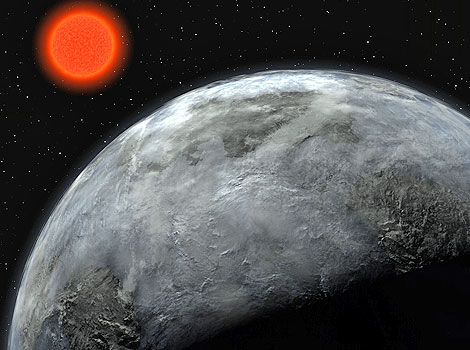
Astronomers find first habitable planet outside solar systemThe first habitable planet similar in size and conditions to Earth has been located in a distant solar system, once again raising the possibility of life on other planets, scientists said on Wednesday.
The as-yet unnamed planet is only about one-and-a-half times the size of Earth and five times more massive, a team of European astronomers announced at the European Southern Observatory in Garching, Germany."We have estimated that the mean temperature of this super-Earth lies between zero and 40 degrees Celsius, and water would thus be liquid," said Stephane Udry of the Geneva Observatory. "Models predict that the planet should be either rocky like our Earth or covered with oceans."The planet is located around a star known as the Gliese 581, about 20.5 light years from Earth's solar system and one of the 100 closest stars to the Sun.
Though the planet is much closer to its star than earth is to the Sun, conditions are similar because the Gliese 581, known as a red dwarf, is smaller and colder. One year lasts only 13 days on the planet."Red dwarfs are ideal targets for the search for such planets because they emit less light, and the habitable zone is thus much closer to them than it is around the Sun," said Xavier Bonfils of Lisbon University.More than 200 so-called exoplanets - planets outside of the Sun's solar system - have been discovered in the past 12 years since the first one was found. Most are massive bowls of gas similar to Jupiter.The same team of astronauts discovered another planet around the same red dwarf two years ago - a Neptune-sized planet about 15 times as massive as Earth. An extensive analysis of the latest find is to be revealed in the journal Astronomy and Astrophysics.
Xavier Delfosse of Grenoble University in France said the newfound planet could inhabit life and will definitely be a target of future space missions to find extra-terrestrial beings."Liquid water is critical to life as we know it," he said. "On the treasure map of the Universe, one would be tempted to mark this planet with an X."
